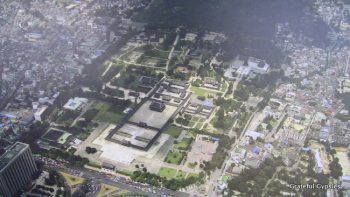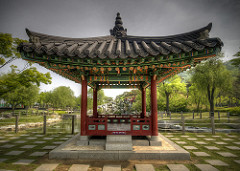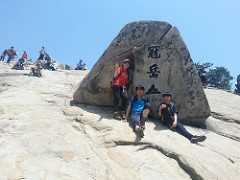Gyeongbokgung Palace (경복궁) Posted by sasha on Jan 21, 2015

One of the main tourist attractions in Seoul is Gyeongbokgung (경복궁), the former royal palace of the Kingdom of Joseon (조선). This great kingdom lasted from 1392 to 1897, with the palace being built early on in 1395 by King Taejo. Of the Five Grand Palaces built in Seoul during the Joseon period, this is…
Learn Korean Progressive Tense Posted by Soo on Jan 19, 2015

When people talk with their friend on the phone, they usually ask each other what they are doing. In the situation, you would need to use progressive tense which is “~ing Form/ ~고 있다/go it da/” Verb stem + 고 있다 is conjugated. For instance, to eat/먹다 + 고 있다 = 먹고 있다 -> I…
Learn Korean Particles Posted by Soo on Jan 12, 2015
에/ae and 에서/aeseo are most difficult Korean particle to classify for students. Students in the advanced level even get often confused, so do not be frustrated to learn this. 에 means usually “To”; I am going to Seoul/저는 서울에 가요/jeo nun seoul ae gay o. 에서 mean usually “at, in”, also one needs to do…
Talking about Hobbies in Korean Posted by Soo on Jan 5, 2015

What do you usually ask when you have a small talk with new people you meet for the first time? As I am Korean, I usually ask their hobby to make some common. I think it is great way to make a friend because there can be many kinds of topic and story. First of…
Korean Honorific Posted by Soo on Dec 31, 2014
Koreans use the honorific when they speak to stranger or older than themselves. Using the honorific is very important in Korea because it can be very rude without using the honorific. I am sure that you can use your foreigner card for a while, but it will not work for everyone in Korea. To give…
10 Aweosme Things to Do in Seoul Posted by sasha on Dec 29, 2014
Seoul is far and away the biggest city in South Korea, and it’s the cultural, political, and educational center of the country. Just about everyone visiting the ROK ends up here at some point in their trip, and for good reason. It’s a vibrant city that blends traditional and modern aspects of life in Korea…
Korean Phrases Using “When” Posted by Soo on Dec 22, 2014
“When” is AV~(으)ㄹ 때/ddae in Korean and it is very high frequency and useful conjunction you must know when you learn Korean language. As you use “When” a lot in your language, Koreans use it a lot as well. Let’s be familiar how to use it by reading examples below. Vocabulary: attend/다니다/da ni da, eat/먹다/moek…


